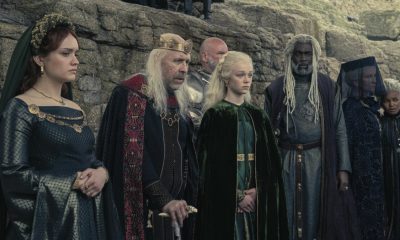Business
Netflix’s ‘Inventing Anna’ is as hollow and flashy as its namesake

Some shows are so bad you can’t help but binge them, but Netflix’s Inventing Anna misses even that mark. Created by Shonda Rhimes and based on the true story of Anna Delvey/Sorokin as published in The Cut, the series is not nearly fun enough to justify its length, quality, or even existence.
Julia Garner stars as Delvey, a German heiress who fits squarely into the ultra-wealthy millennial narcissist archetype of the early 2010s. But it turns out that Anna Delvey isn’t who she says. In fact, she doesn’t even exist. While scamming everyone she meets, she racks up a tab of hundreds of thousands of dollars that no one can pay off.
Rhimes is no slouch when it comes to spicy soaps, but Inventing Anna lacks the magnetism of shows like Bridgerton, Scandal, and How to Get Away with Murder. The production budget appears to be $12 and a prayer, with most of the burden put on music supervision and editing to package everything in a remotely engaging way. There is something in the writing, directing, and acting of this series — perhaps something in the water on set — that brings out lackluster performances from an otherwise reliable cast including Anna Chlumsky, Arian Moayed, Laverne Cox, and many more.

Credit: Aaron Epstein / Netflix
The series ultimately turns out to be as self-absorbed and shallow as its alleged protagonist — more interested in garish montages of high-end lifestyle and the media industry than in actually figuring out what makes Delvey tick beyond a propensity for all things shiny. I don’t know who needs to hear this, but we can retire white feminist millennial narcissism as a television trope altogether. In the final episode, one character shames another for profiting off Anna’s notoriety — as if the entire show isn’t doing the same thing by cashing checks and glamorizing something it never seems to understand. Inventing Anna is its own scam artist, playing the part of a show with something meaningful to say, when it’s not actually worth its runtime.
I don’t know who needs to hear this, but we can retire white feminist millennial narcissism as a television trope altogether.
Delvey’s story is drawn out into 9 episodes, with the finale clocking in at over 70 minutes. That’s a heavy investment to ask of the audience, particularly for such a niche story. Comparatively, a few days of headlines have spurred multiple Game Stop-inspired projects to be announced. Chances are reading the words “Game Stop” just made you blink twice and ask “What year is it?” Just typing “Game Stop” right now felt wrong.
Every headline doesn’t have to be a limited series — in fact, it’s the older ones like American Crime Story or true crime dramas that work best in this genre, having stayed in the cultural consciousness for years before being adapted. Viral though they may be, stories like Delvey’s are fleeting; Twitter finds its next main character for the day and moves on at the speed of a click. These projects and the stories they’re based on become dated far too quickly.

Credit: Nicole Rivelli / Netflix
This one also happens to be niche, local, and privileged — three factors that do not add up to a broad television audience. The parts that zero in on New York’s media industry through Chlumsky’s character and Rachel-from-Vanity-Fair (Katie Lowes) will speak to a minority that no one cares about nearly as much as we’d like to think. If anything, the combined ubiquity of Shondaland and Netflix will be what gets viewers on board. Delvey herself does not plan to watch the series. But if she does, she may wish her New York adventures were given the same treatment as Emily’s in Paris.
-

 Business7 days ago
Business7 days agoAI chip startup DEEPX secures $80M Series C at a $529M valuation
-

 Entertainment6 days ago
Entertainment6 days agoJinkx Monsoon promises ‘the queerest season of ‘Doctor Who’ you’ve ever seen!’
-

 Business5 days ago
Business5 days agoStrictlyVC London welcomes Phoenix Court and WEX
-

 Entertainment5 days ago
Entertainment5 days agoHow to watch every ‘Law and Order’ online in 2024
-

 Entertainment5 days ago
Entertainment5 days agoBookTok and teens: What parents need to know
-

 Business5 days ago
Business5 days agoWhy Apple’s ‘Crush’ ad is so misguided
-

 Entertainment6 days ago
Entertainment6 days ago'House of the Dragon' recap: Every death, ranked by gruesomeness
-

 Business4 days ago
Business4 days agoWomen in AI: Rep. Dar’shun Kendrick wants to pass more AI legislation






















